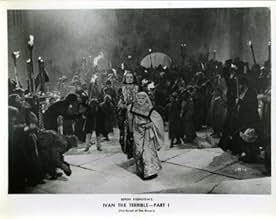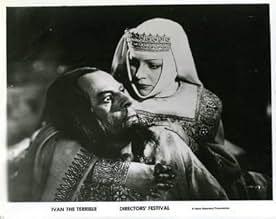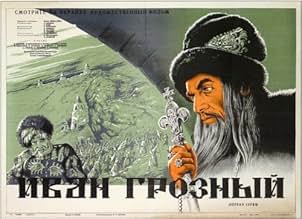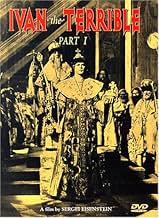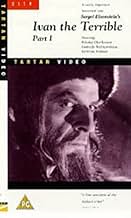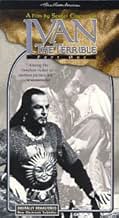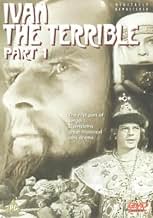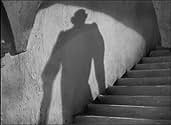IMDb RATING
7.7/10
11K
YOUR RATING
During the early part of his reign, Ivan the Terrible faces betrayal from the aristocracy and even his closest friends as he seeks to unite the Russian people.During the early part of his reign, Ivan the Terrible faces betrayal from the aristocracy and even his closest friends as he seeks to unite the Russian people.During the early part of his reign, Ivan the Terrible faces betrayal from the aristocracy and even his closest friends as he seeks to unite the Russian people.
- Awards
- 2 wins & 1 nomination
Aleksandr Rumnev
- The Stranger
- (as Aleksandr Rumnyov)
- Director
- Writer
- All cast & crew
- Production, box office & more at IMDbPro
Storyline
Did you know
- TriviaTook over 3 years to make.
- GoofsAfter Anastasia's death, when discussing the Livonian war the "only" son of the Czar is mentioned. However at the time Ivan had two sons, Feodor, who became Czar Feodor I of Russia, and also Tsarevich Ivan Ivanovich.
- Quotes
Czar Ivan IV: Those who tore down the bells without Czar's permission, those by Czar's command get torn down the heads for not too long.
- Crazy creditsAll the credits are showed in front of a fire smoke.
- ConnectionsEdited into Histoire(s) du cinéma: Une histoire seule (1989)
Featured review
On a backdrop of intrigue, murder and betrayal, Prince Ivan conquers enemies and becomes the first Czar of all Russia, at the cost of his own soul.
Eisenstein's name and reputation loom over film history in such a forbidding way that you would be forgiven for deeming his work impenetrable by modern standards, yet while his silent epics are so seminal as to be hard to evaluate objectively, his late talking films can be hugely rewarding viewing, even to more casual film-goers. As a summation of his artistic evolution and scholarship, they are no less treasurable or significant than Battleship Potemkin, yet they have a more compelling story to tell.
Ivan The Terrible was to be a trilogy, of which only parts 1 and 2 were completed before their creator fell into disfavor with Stalin. Yet parts 1 and 2 are rich enough that together they form a perfect story ending on a chilling note. On to part 1 then...
Part 1 tells the story of Prince Ivan from young hopeful to warlord and recluse, before he truly accepts his calling. It is an incredibly romanticized tale, and formally, a relic of a time long gone, one that perhaps only ever existed in Eisenstein's mind. His was a unique visual sensibility and the Ivan films are full of layered, meticulously composed and designed shots: characters scurry like rodents through claustrophobic tunnels, the look is at times so expressionistic as to evoke where The Cabinet of Dr Caligari might have evolved. It is both familiar and horribly alien, like the nightmare it later confirms itself as in part 2.
Given the conflicting emotions evoked - heroism with oppression, epic scale but suffocating formalism - you would do well to brace yourself through this one and remember that only once you've seen both parts will it all make terrible sense. Only then will you appreciate the unique genius at work here.
One cannot distinguish between the two Ivans for one cannot exist without the other, and together, they form one of the best films ever made.
Eisenstein's name and reputation loom over film history in such a forbidding way that you would be forgiven for deeming his work impenetrable by modern standards, yet while his silent epics are so seminal as to be hard to evaluate objectively, his late talking films can be hugely rewarding viewing, even to more casual film-goers. As a summation of his artistic evolution and scholarship, they are no less treasurable or significant than Battleship Potemkin, yet they have a more compelling story to tell.
Ivan The Terrible was to be a trilogy, of which only parts 1 and 2 were completed before their creator fell into disfavor with Stalin. Yet parts 1 and 2 are rich enough that together they form a perfect story ending on a chilling note. On to part 1 then...
Part 1 tells the story of Prince Ivan from young hopeful to warlord and recluse, before he truly accepts his calling. It is an incredibly romanticized tale, and formally, a relic of a time long gone, one that perhaps only ever existed in Eisenstein's mind. His was a unique visual sensibility and the Ivan films are full of layered, meticulously composed and designed shots: characters scurry like rodents through claustrophobic tunnels, the look is at times so expressionistic as to evoke where The Cabinet of Dr Caligari might have evolved. It is both familiar and horribly alien, like the nightmare it later confirms itself as in part 2.
Given the conflicting emotions evoked - heroism with oppression, epic scale but suffocating formalism - you would do well to brace yourself through this one and remember that only once you've seen both parts will it all make terrible sense. Only then will you appreciate the unique genius at work here.
One cannot distinguish between the two Ivans for one cannot exist without the other, and together, they form one of the best films ever made.
Details
Box office
- Gross worldwide
- $12,196
- Runtime1 hour 35 minutes
- Color
- Sound mix
- Aspect ratio
- 1.37 : 1
Contribute to this page
Suggest an edit or add missing content



